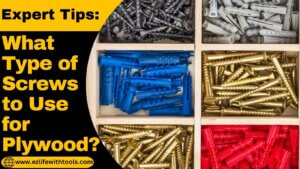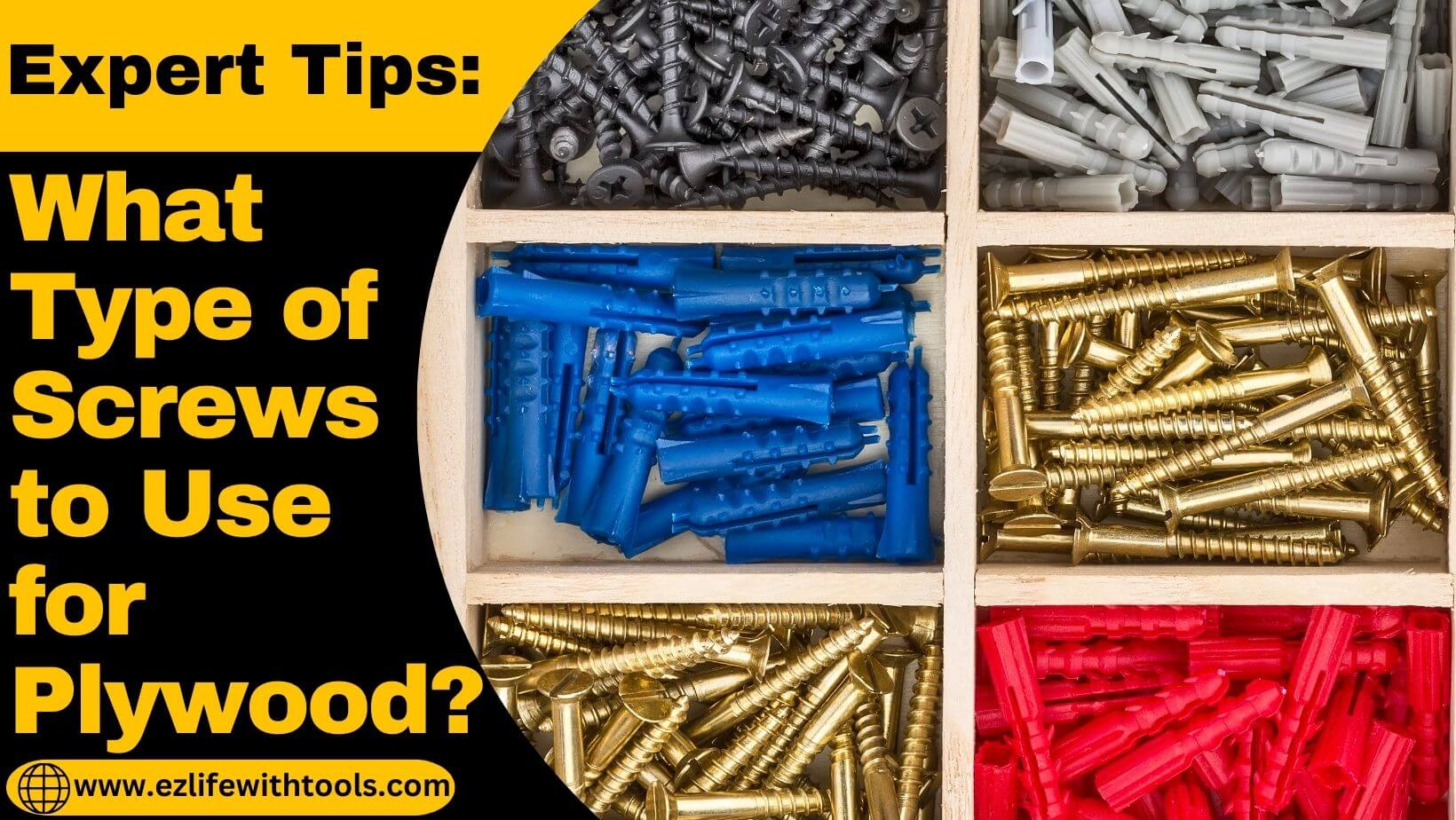Expert Tips: What Type of Screws to Use for Plywood?

Every beginner wants to know what type of screws to use for plywood which can make sure the structural integrity and longevity of our woodworking project.
Because due to its layered composition, plywood requires specific screws that can securely hold its layers together without causing splitting or damage.
In this article, I will explain the different types of screws, suitable screws for plywood, screw selection and installation.
So, keep reading.
What is a Screw?
It is a threaded cylindrical shaft with a helical ridge made of metal which is used as a fastener and is called a screw. It has a head on one side and a pointed tip on the other. When it is rotated with the help of a screwdriver, it creates a mechanical force which drives it into the required material.
Types of Screws
- Carriage bolts
- Decking screws
- Double ended screws
- Drywall screws
- Eye bolt screws
- Framing screws
- Confirmat Screws
- Fillister head screws
- Hex cap screws
- Hammer drive screws
- Lag screws
- Machine screws
- Masonry screws
- Oval head screws
- Pan-head screws
- Particle board screws
- Square head bolts
- Self-drilling screws
- Particleboard Screws
- Set screws
- Shoulder screws
- Sheet metal screws
- Socket-head screws
- Thread cutting screws
- Washer-faced screws
- Wood screws
- Weld screws
- Tamper-proof screw
What Type of Screws to Use for Plywood?
Types of Screws Suitable for Plywood
- Wood Screws
- Sheet Metal Screws
- Particleboard Screws
- Confirmat Screws
- Drywall Screws
1- Wood Screws
Wood screws are a popular choice for plywood due to their threading designed to grip wood fibres securely.
The details are given below.
⊗Types of Wood Screws
Countersunk Screws: These have a flat head that sits flush with the surface when driven into the material. It is commonly used in applications requiring a smooth finish, like cabinetry or furniture-making.
Round Head Screws: These screws have round heads and are suitable for applications where a decorative or raised finish is preferred to achieve a traditional appearance.
Pan Head Screws: Similar to countersunk screws but with a rounded, slightly protruding head, these screws offer a middle ground between flat and round heads. They work well in applications requiring a more finished look without being entirely flush.
Bugle Head Screws: These screws have a slightly curved surface under the head to provide better grip and reduce the chances of damaging the plywood surface.
⊗Screw Materials
Steel Screws: Most wood screws are made from steel, which comes in different grades. Stainless steel screws offer excellent corrosion resistance, making them suitable for outdoor applications or projects exposed to moisture.
Brass Screws: These types of screws are used for decorative purposes due to their aesthetic appeal and resistance to corrosion. But they are softer than steel screws and may require pre-drilling to avoid breakage.
Coated Screws: These types of screws have a coating of zinc or other finishes to enhance their durability and corrosion resistance.
⊗Application of Wood Screws
Wood screws are commonly used to assemble plywood furniture, cabinets, shelving, and other woodworking projects.
2- Sheet Metal Screws
Despite their name, sheet metal screws also work well with plywood. Their sharp threads and fine tips make them suitable for attaching plywood to metal or plastic surfaces while providing excellent holding power.
⊗Types of Sheet Metal Screws
Pan Head Screws: These screws have a slightly rounded head and are suitable for applications where a smooth, finished appearance is required.
Flat Head Screws: These screws consist of a flat top to sit flush with the material’s surface, providing a sleek and neat finish.
Hex Head Screws: These screws have a hexagonal head, allowing for easier application of torque and are often used in applications requiring higher tightening torque.
⊗Screw Materials
Steel Screws: Commonly sheet metal screws made of steel which provide better strength and durability. Stainless steel screws are a suitable choice for outdoor or high-moisture environments.
Galvanized Screws: These types of screws are coated with zinc to increase corrosion resistance. This coating makes them ideal for applications exposed to moisture or harsh conditions.
Other Coatings: Some screws may also have coatings of nickel or brass for enhanced aesthetics or additional corrosion protection.
⊗Applications of Sheet Metal Screws
Construction and Framing: Sheet metal screws are used in construction projects, automotive repairs, machinery or other applications that involve attaching metal components to plywood structures or frames.
3- Particleboard Screws
These screws are specially designed to provide secure and durable connections because it is used with engineered wood products like plywood and particleboard, which tends to be softer and less dense compared to solid wood.
⊗Types of Particleboard Screws
Coarse Thread Screws: These screws have deep, widely spaced threads that work well in engineered wood to provide a firm grip without causing excessive damage.
Flat Head Screws: These screws are commonly used for plywood and particleboard. These screws consist of a flat top to sit flush with the material’s surface, providing a sleek and neat finish.
Chipboard Screws: It is designed explicitly for chipboard, which is a type of particleboard made from larger wood chips; these screws have a coarser thread profile for better grip.
⊗Screw Materials
These screws are also made of steel, and some of them may be coated with zinc or yellow zinc.
⊗Applications of Particleboard Screws
Furniture Assembly: Particleboard screws are extensively used in assembling furniture, cabinets, shelves, wall panels, partitions, and other household items made from engineered wood.
Note: Particleboards are softer compared to solid wood. So, do not to over-tighten the screws, as this can cause damage to the material.
4- Confirmat Screws
Confirmat screws are specially engineered for joining plywood and particleboard without the need for pilot holes. Their unique design reduces the risk of splitting and ensures a strong, concealed connection, commonly used in furniture construction.
⊗Design and Structure
Confirmat screws have a unique thread design characterized by two sections. One of them is a coarse, aggressive thread at the tip and a finer, less aggressive thread closer to the head. The coarse thread helps to grip the material firmly, while the finer thread helps to close the two pieces of material tightly together.
⊗Screw Material
Confirmat screws are primarily made of steel, offering durability and strength for woodworking applications. Many of them also have a zinc coating.
Zinc Plating or Coatings: Many Confirmat screws have zinc plating or coatings to enhance corrosion resistance, which is particularly beneficial for furniture assembly where exposure to moisture is possible.
⊗Applications of Confirmat Screws
Confirmat screws are extensively used in the manufacturing and assembly of furniture, including cabinets, shelving units, and other wooden fixtures.
They are also the preferred choice in various woodworking projects where strong and concealed connections between wood panels or boards are required.
5- Drywall Screws
Although primarily used for drywall installation, drywall screws can be suitable for light-duty plywood applications. They feature fine threads and a bugle-shaped head, but their holding power might be limited compared to other screw types.
⊗Types of Drywall Screws
Coarse Thread Screws: These screws are suitable for wood studs due to deeper threads which provide better grip and hold in wooden materials.
Fine Thread Screws: These are designed for metal studs or lighter gauges of steel framing. Fine thread screws have shallower threads that can bite into metal more effectively.
⊗Design and Features
Drywall screws typically have a fine-threaded design to insert into drywall without causing much damage. They often feature bugle heads, which have a slightly curved surface under the head to prevent tearing the paper surface of the drywall.
⊗Screws Material
Drywall screws are commonly made of steel, but many drywall screws have phosphate or black phosphate coatings to provide corrosion resistance and aid in easier penetration into the drywall.
⊗Applications of Drywall Screws
Drywall screws are essential in attaching drywall sheets to studs during interior wall installation, repairing or patching damaged drywall in residential and commercial buildings.
Factors to Choose the Screws
- Ensure the screws are long enough to penetrate the plywood without protruding excessively.
- Consider the head type that suits your project.
- Coarse threads offer better grip in plywood compared to fine threads.
- Choose screws with corrosion-resistant coatings if your project is exposed to moisture.
- Determine the load the screws will bear and choose accordingly.
Tips for Screw Installation
- Use pilot holes to prevent splitting, especially near the plywood edges.
- Over-tightening screws can damage the plywood; ensure a snug fit without excessive force.
- When needed, use washers to distribute the load and prevent sinking of the screw heads into the plywood.
Conclusion
Selecting the right screws for plywood is pivotal in ensuring the structural integrity and longevity of woodworking projects. While various screw types offer unique advantages, considering factors like screw type, length, head design, and intended application is crucial. Wood screws, sheet metal screws, particleboard screws, confirmat screws, and drywall screws each have their merits, making them suitable for different plywood projects.
I have described all the factors and types to solve the query about what type of screws to use for plywood.
I am confident that you are satisfied with it.
Go and choose your required type of screws and start your project.
Thank you for your time.
Best wishes
Frequently Asked Questions
What screws do I need for 18mm plywood?
Length of 1 inch screws is suitable for 18mm plywood. But it is also important to choose the screws according to that material that you are attaching to plywood.
What screws for 12mm plywood?
3/4 inch to 1 inch screws are suitable for 12mm plywood. These screws are appropriate to securely fasten the plywood without protruding excessively.
What size screws for plywood walls?
It depends on the thickness of plywood and type of wall material.
1- For standard plywood you can use 1 1/4 to 1 1/2 inch (32mm to 38mm) screws.
2- For thicker plywood, such as 3/4 inch (18mm), you might use 1 1/2 to 2 inch (38mm to 50mm) screws.
But, if you’re attaching plywood to metal or other materials, use screws designed for that specific application.

